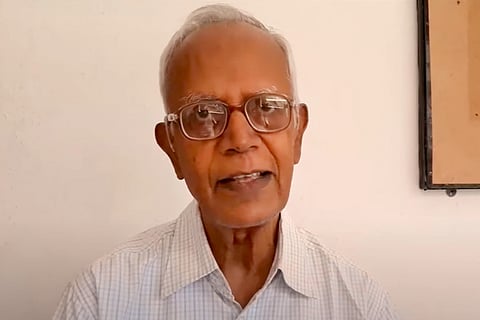

Jesuit priest and human rights activist Stan Swamy passed away in Mumbai on July 5 at 1.30 pm. He was 84. Swamy was undergoing treatment at the intensive care unit of the Holy Family Hospital, where he was shifted from the Taloja prison in Navi Mumbai following a High Court order on May 28 this year. Mihir Desai, Swamy's lawyer, called for a judicial inquiry into the matter.
Incidentally, the Bombay High Court was hearing some petitions, seeking bail and a constitutional challenge to a section of UAPA, on July 5 when his lawyer announced Stan Swamy’s death. He was on life support due to his deteriorating condition. Although the hearing was adjourned to July 6, his lawyer announced Stan’s passing. “It is with a very heavy heart that I have to inform you that father Stan Swamy has passed away,” said Dr D’Souza, the medical director, reported Live Law. He suffered a cardiac arrest at 4.30 am on Saturday, and deteriorated thereafter.
In October 2020, Stan Swamy, was accused in the Elgar Parishad-Maoists links case, and was arrested by the National Investigation Agency (NIA) from his residence in Ranchi. He was one of the many accused who were named by the Pune police in the case, along with others like Varavara Rao and Sudha Bharadwaj. Swamy was said to be the oldest person to be accused of terrorism in India. Many activists across India have repeatedly insisted that the entire case was cooked up and the government was detaining these political prisoners for vendetta.
A native of Tiruchirapalli in Tamil Nadu, Stan Swamy was born in 1937 and was best known for his work with tribal people and the fight for their rights, especially in Jharkhand. He had even served as the Director of Indian Social Institute in Bengaluru from 1975 to 1986.
Following this, he moved back to Jharkhand and mainly worked with tribal people who were getting displaced and dispossessed.
In the Elgar Parishad case, Swamy and his co-accused have been charged by the National Investigation Agency as being members of frontal organisations working on behalf of the banned CPI (Maoists). The NIA had repeatedly claimed that Swamy was a Maoist, who had hatched a conspiracy to create unrest in the country, a charge denied by him.
The Elgar Parishad case is related to inflammatory speeches made at a conclave held in Pune on December 31, 2017, which, the police claimed, triggered violence the next day near the Koregaon-Bhima war memorial located on the outskirts of the western Maharashtra city. The police had claimed the conclave was organised by people with alleged Maoist links.
Swamy, who was said to be suffering from several ailments, including Parkinson's disease, had moved the High Court earlier this year seeking medical treatment and interim bail on health grounds. He had tested positive for coronavirus at a private hospital in June and was subsequently shifted to the ICU.
After his arrest last year, Swamy had requested a supper and a straw in order to eat due to Parkinson's disease, a disorder involving muscle spasms and tremors that can make it extremely challenging for patients to chew and swallow. After more than four weeks, his request was finally fulfilled by Taloja jail authorities.
With PTI inputs